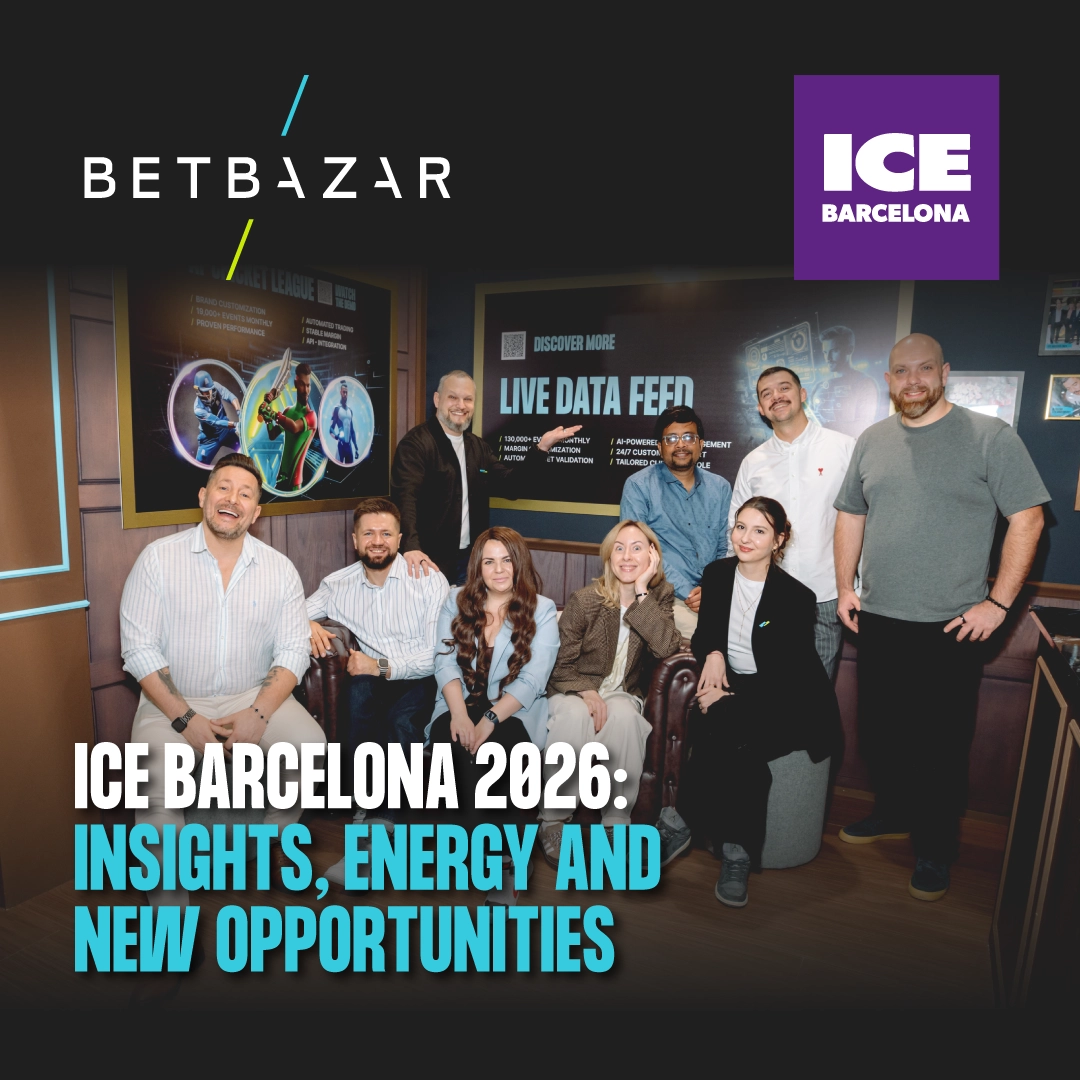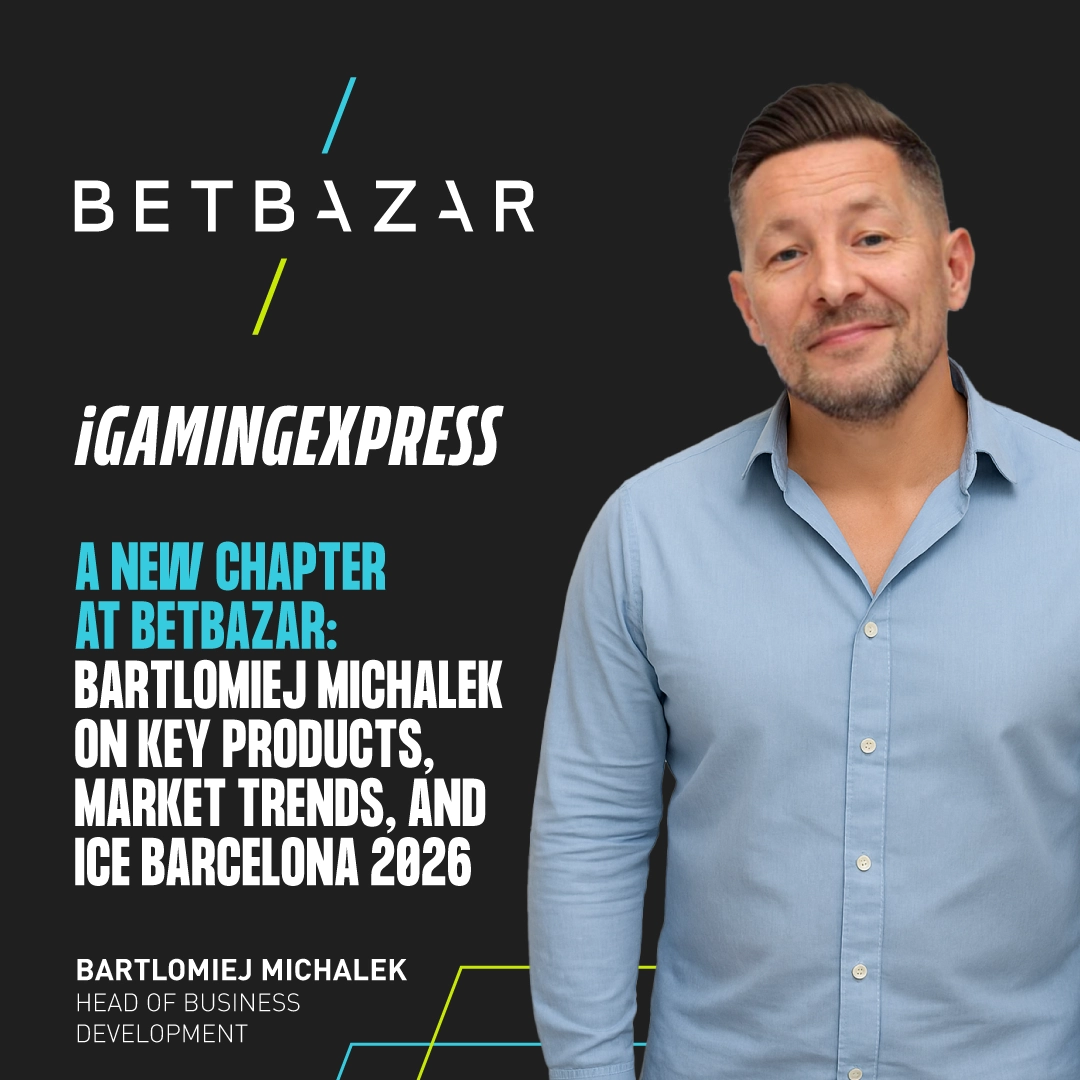
Company Culture with HRD Betbazar
iGaming Next
It’s been four years since the pandemic began, and the definition of workplace culture has changed substantially since then. But how have iGaming companies adapted to remote working and maintaining a strong company culture during that time?
Participants:
Giorgi Tsutskiridze , CCO, SPRIBE
Nana Schneider, HRD, BETBAZAR
Alex Wilson, head of marketing, Microgaming
Jérémy Picard, chief of staff, PandaScore
NEXT: Reflecting on the past four years, how have remote working practices evolved within your company, and what strategies have proven effective in maintaining a cohesive company culture amidst a distributed workforce?
Giorgi Tsutskiridze: From day one, we embraced remote and hybrid working and were super flexible when it came to whether someone wanted to work from the office or home – or both. Employees were able to choose where they worked based on their schedules and ultimately where they believed they were the most productive and could achieve their full potential.
The pandemic forced people to work from home, but over the last 12 months or so, companies including SPRIBE have started to gradually switch to a full-time office format. This is because there are so many benefits to having employees working from the office, for both the organisation and its staff.
We’ve tried to make the switch to office-based working as smooth as possible by creating comfortable and inspiring workspaces, offering regular team-building activities and ensuring we run plenty of social events throughout the month. This includes poker tournaments and Happy Friday, which brings all team members together to round off the week.
Nana Schneider: While we’ve refined and improved our remote working practices over the past four years, the fact that BETBAZAR was formed shortly before the pandemic hit meant that this has always been an important part of our model.
Following the war in Ukraine, a lot of people moved to different countries and now BETBAZAR’s representatives are spread across eight different European countries, so it’s been key for us to continue functioning efficiently.
To do this effectively, we’ve fostered a culture of flexibility and trust while also providing all the equipment needed to work no matter their location. We’ve never had a serious tracking system in place for working hours, so one of the main things has been treating people like adults and allowing them to manage their time in a way that works for them.
Alex Wilson: At Microgaming, flexible working was present in the business prior to the pandemic, although it was formalised during this period and has allowed employees to change their working environments and patterns to suit them more flexibly. This has helped to create a greater feeling of autonomy and trust.
We have continued to offer flexible working post-pandemic with employees empowered to work from home and fully supported by the business with the technology and physical equipment to do so. This flexibility appeals to young families and employees with dependents, and we still find this a real draw as well as a retention tool that not all iGaming companies in Microgaming’s geographies can accommodate.
We also introduced a work from home policy where employees apply to work remotely for a greater proportion of the working week than they would work from the office. Further policies were introduced off the back of this, including a Work from Anywhere policy, which has opened up gateways for travel. We have a number of remote workers who add tremendous value to our operation who can operate as such because of the infrastructure and openness.
We do encourage employees to come into the office for most of the week to ensure that we don’t miss out on any collaboration or in-person relationship building. This is role modelled by the senior leadership team who spend the majority of their time in the office, demonstrating the value of face-to-face interactions.
For those who can’t join in Microgaming has also rolled out a number of hybrid events and technology-enabled initiatives, such as April’s Steps Challenge which aims to promote wellness by way of tracking step count on a leader board. This has not only created an element of friendly competition, but has also ensured that we remain connected and our relationships remain intact.
Jérémy Picard: Before COVID, people came into the office every day, there was a lot of in-person collaboration. But during the pandemic, we completely shifted how we work.
Now, we have a fully flexible work policy that we designed with our employees. Our employees, or Pandas as we like to call them, can choose when they want to go into the office. It’s fully flexible, and so far, it’s working really well. We primarily don’t want to force the Pandas to come into the office if they prefer to work remotely. But when they do decide to come in, as a HR team we aim to make that experience as enjoyable as possible by organising various different events – often centred around food and games!
This flexible working approach has suited our company really well, as we aim to foster a gaming-centric culture; much of our team enjoy playing video games, so they are used to having their social life centred around the digital world. That shift towards remote working has, as a result, been somewhat of a second nature for us.
We ensure that we’re constantly communicating with our team via Slack and Discord. The great thing about these two platforms is that ability to connect with one another is seamless and instant – you don’t have to spend the time creating meeting links, or sending out calendar invites. You’re only one click away from chatting with your colleagues.
We also host weekly, company-wide calls which are very important for everyone to stay in touch – these meetings always start with an icebreaker or company-wide game. We don’t want the conversation to just be about work.
On a yearly basis, we also host in-person gatherings such as our tech team building, our pandackathon, or a long gathering weekend which tend to be hosted in a different city every year. We also run regular gaming sessions, otherwise known as pizza lol, where Pandas come together to game and enjoy pizza together.
These face-to-face meet ups are great for building team morale and fostering those relationships. We also encourage all remote pandas to come and visit the office as soon as they feel disconnected from it, on a voluntary basis. When you have a remote company, it’s so important to have that strong connection with your employees.
NEXT: From a hiring perspective, how have your practices adapted to ensure alignment with your company’s culture and values, particularly in assessing candidates’ ability to thrive in a remote / hybrid working environment?
Nana Schneider: At BETBAZAR, we think a prospective contractor’s personality and outlook is just as important as their professional skill set. We only look to make agreements with individuals whose beliefs and values mesh with the company culture that we’ve developed. We see every new agreement as a project for the long term and don’t want to spend time training and upskilling people who aren’t going to be able to work within our flexible models.
At BETBAZAR, we place a lot of emphasis on people who are adaptable, able to take initiative and can do their work independently. That being said, as much as we want to integrate new people into the values that we represent, I think it’s also important that each person plays a role in shaping the company culture too – identifying individuals who can do that is a major part of our acquisition strategy.
Jérémy Picard: Previously, most of our hirings have been based out of our Paris office. We felt like we needed to physically meet the person to see whether they would be a good fit. Simultaneously, we were also hiring sales/traders remotely – we did have an onboarding process in place where we focused on creating a friendly remote company but also made the new team members feel integrated into PandaScore.
But since the pandemic, this has changed considerably. With remote working, we aren’t limited to hiring people from one location. In fact, we now feel like we can recruit someone from anywhere in the world – two years ago, we wouldn’t have been able to do that, and it has opened the doors up to so many great profiles. While we are happy to receive candidates at the office, now most of our hirings are made remotely
We see the hiring process as the beginning of the onboarding process. We use the hiring process to share insights about our partners, our mission statement and our core values; the candidate is encouraged to tell us about themselves too.
We don’t just look at their personal skills, but at their personality too. To try gauge whether they will enjoy working with PandaScore, we run a series of 20-minute calls with members of the team – a ‘culture fit’ if you will. It’s not all about the job, but about finding those cohesions and whether there are common interests. We want to foster that relationship with the candidate as early as possible and create that sense of trust between us.
Alex Wilson: Our values are at the forefront of the hiring process, and we emphasise the importance of the behaviours that we champion. Candidates are assessed not only for their skills and qualifications but also their behavioural competencies in line with our values.
We openly communicate our collaborative culture to candidates and encourage them to spend time in the office during their onboarding period when they first start with us. This provides new starters with plenty of opportunities to fully immerse themselves in our company culture, understand our values and build relationships with their colleagues in-person, setting a solid foundation for any future hybrid working arrangements.
At Microgaming, we champion values such as agility, integrity and unity – each of which play a pivotal role in how we operate as an organisation. According to our team, these values transcend the different departments within Microgaming and show that we are adaptable, dependable, that we work towards the highest standards and that by working together, we can achieve more. When you combine these core values, our team is confident that we have the strength to do what is right – and that is evidenced in our CSR and ESG initiatives.
PlayItForward is also heavily referenced by candidates and is reflective of our ethos to do the right thing and invest in people, place and planet. Volunteer projects provide another avenue for employees to come together and bond outside of an office environment – together we’ve planted a 1,500 sapling Microforest, repopulated puffin populations on the islands coastline and cleaned public spaces for our communities to enjoy.
Giorgi Tsutskiridze: At SPRIBE, we are only interested in one thing – hiring the absolute best person for the job. To do this, we understand that we need to provide the optimal work environment to ensure they can achieve their full potential. In our experience, employees like the structure and social aspect of office-based working, and that’s why we have several offices around the world where employees can work.
While we started as a hybrid working company, the growth the business has experienced and the scale it has now reached means that we need to have all employees working from the office. That said, our company culture has remained the same from day one and this is what enables us to attract talent and highly ambitious individuals to the organisation – being part of SPRIBE is more important than being able to work from home.
NEXT: What specific adjustments has your company made to their company culture in the years following the pandemic, such as fostering a greater emphasis on employee well-being, mental health support, and work-life balance?
Alex Wilson: Employee wellbeing has always been a priority for us, both prior to and during the pandemic, and has continued thereafter. The broader conversation in society about wellbeing and work-life balance has encouraged our employees to speak up and seek out the support available to them, so we’re proud that the framework has been in place to be there as a support. This includes an Employee Assistance Programme, private healthcare cover, regular wellbeing talks and initiatives, and promoting the need for boundaries between work and home.
These resources are readily available to support employees in managing their mental health and achieving a healthy work-life balance.
Giorgi Tsutskiridze: It’s always been important to help employees strike a good work-life balance and for organisations to support their well-being and mental health, but the pandemic definitely brought this to the fore. At SPRIBE, we promote employee well-being by running regular team-building events, weekly socials and we even hold regular poker tournaments that are really popular with the team.
As well as having fun, it’s important to ensure that every team member feels valued and that they are supported and encouraged by senior management and team leaders. Personal development is also a big part of employee well-being, and we offer plenty of opportunities for personal and professional learning and development.
By prioritising employee well-being and providing an environment for staff to thrive, develop and grow, we ensure each member of the team feels like they have a long future with SPRIBE and that their position in the company is highly valued and secure.
Jérémy Picard: As a remote company, it can sometimes be quite difficult to spot whether someone is having a difficult time; we roll out regular, anonymous mood surveys that enable the Pandas to tell us how they are feeling which allows us to adapt to any potential issues that our teams are facing.
We also encourage our department leaders to have regular discussions within their team too to discuss how they feel about working remotely. And we do yearly HR follow-ups where we always learn a lot. As Chief of Staff, I also sit down with members of our team from across the company to discuss how they are feeling, what we can do better. We strongly encourage open and honest communication.
At PandaScore, there are no wrong questions, no wrong feelings. We want to keep that dialogue open and to make our team feel like they can share anything with us.
Nana Schneider: Even looking beyond the pandemic, BETBAZAR has always placed a great deal of emphasis on maintaining a healthy and happy workforce – but we also acknowledge that the past four years have been especially tough for a lot of people.
From my perspective, one of the main things is recognising that individuals have a life outside of work and that the developments they make in the personal sphere are equally as important as those they make in the professional one.
For this reason, we’re incredibly flexible with our working hours. If an employee (contractor) finds a class or activity that can help them learn a new skill or maintain a healthier lifestyle, we fully support that by providing them with time to pursue these interests. Likewise, if a person needs some time off for a vacation or just for a reset, our HR software makes this very easy to do.
NEXT: Looking ahead, what do you envision for the future of workplace culture in the iGaming industry, considering the lessons learned and changes observed over the past four years? How do you plan to adapt and innovate to ensure a vibrant and inclusive company culture in the years to come?
Jérémy Picard: It’s important to be aware of what’s going on in your team and communicate any changes in an open and honest manner. What works for you and your company today may not necessarily work tomorrow. In addition to fostering open communication and adapting to feedback, we recognise the importance of striking a balance between structured processes and flexibility in our workplace culture.
At PandaScore, we are always listening to feedback from our Pandas and use these insights to evolve our working policy. Our policy does, and always will, reflect the people within our company and that’s something we’re very proud of. In our last employee satisfaction survey, 99% of Pandas said they wouldn’t change anything about the company’s current policy, which is great to see.
Moreover, while remote work offers numerous benefits such as increased flexibility and access to a broader talent pool, it’s essential to acknowledge that it also presents challenges, such as potential feelings of isolation and difficulty in maintaining team cohesion.
As we look to the future, our focus is not solely on promoting remote work but on finding the optimal blend of remote and in-person collaboration that maximises productivity, creativity, and employee well-being. we must continue to find new ways to keep your team happy and keep evolving as a business.
Nana Schneider: My personal feeling is that the COVID-19 pandemic and the changes in working practices that it brought about have been a bit of a wake-up call for many people in our industry.
Not only have we learnt that the vast majority of people are hard-working professionals who are able to structure their hours and working schedule outside of the office effectively, but we’ve also seen the importance of having a more human side to your business.
In my opinion, both of these things are positive developments and I’d hope to see more iGaming companies continue to offer hybrid working models that place a greater focus on work-life balance.
From BETBAZAR’s perspective, we’ll continue to do what we’ve always done – give our people the freedom to develop and grow while also offering more group activities that unite our workforce.
Giorgi Tsutskiridze: Talented people want to contribute to a successful business where their involvement is valued and rewarded. This has always been the case and won’t change any time soon. Over the past four years, we have gone from most people working from the office to everyone working from home to having the choice between the two.
From that, we have learned that some people like working remotely and others from the office, but for the vast majority office-based working is their preferred option. Companies that want to attract the best talent and keep it need to provide the right office environment, and also ensure employees are given the freedom to fly.
Valuing their contribution is a must, as is ensuring they strike the right work/life balance and have plenty of opportunities to socialise and have fun while at work. This is what allows individuals to unlock their full potential and ultimately enjoy the work they do.
Alex Wilson: The lessons learned from the past four years have highlighted the importance of adaptability and resilience in navigating challenges such as remote work and changing market conditions.
Greater collaboration across the business will continue to be a central focus – it helps to form stronger working relationships, not just in teams but across departments. Loneliness and feelings of isolation were an outcome of the pandemic across all industries, so being able to form those connections and have regular interactions with colleagues will also support our employees.
Agility and flexibility remain a focus to make sure that our employees can achieve a work-life balance whilst still reaching their full potential. This may be in the form of flexible working, but also in how they do their work, what work they do, finding new avenues of innovation etc.
Betbazar es un ecosistema de entretenimiento global que conecta a los proveedores con sus respectivos operadores y plataformas. Buscamos y validamos productos para las casas de apuestas y trabajamos como oficinas de ventas externas para los proveedores. Nuestra misión es ayudar a cada casa de apuestas a encontrar su producto perfecto.
About the Role
We are looking for a charismatic Business Development Manager with deep experience in the sports or esports industry and strong communication skills. The ideal candidate is proactive and thrives in a fast-paced, data-driven environment.
This is a unique opportunity to join a stable and forward-thinking company where you’ll have access to powerful tools, top industry contacts, and a clear path for growth.
Key Responsibilities
- Identify, approach, and close business deals.
- Leverage your network and CRM systems to drive sales and build long-term client relationships.
- Communicate with decision-makers at top-tier companies.
- Lead negotiations.
- Collaborate closely with internal teams and contribute to strategic growth.
- Maintain accountability for pipeline management and performance tracking.
- Stay up-to-date with industry trends and use data to inform your strategy.
Must-Have Qualifications
- 3+ years of proven success in sports or esports business development or sales.
- Fluent in English (Spanish and/or Portuguese are strong advantages).
- Experience using CRM systems and working with large data sets.
- Strong negotiation and networking skills.
- Contacts within top companies in the industry.
- Excellent communication, time management, and problem-solving skills.
- Analytical mindset with the ability to make data-driven decisions.
- Resilience under pressure and a strong team spirit.
Preferred Qualifications
- Based in Europe
- Experience in a single company for more than 1.5 years
- Motivated by success
- Confident personality with a proactive attitude
What We Offer
- Stable income with the potential for high earnings through bonuses and performance-based rewards.
- Access to powerful CRM platforms, professional tools, and industry databases.
- Subscriptions, resources, and the opportunity to attend global conferences and training.
- Company-sponsored participation in top industry conferences — travel, tickets, and arrangements are handled by us.
- Work with a data-driven company that values innovation and growth.
- Supportive, high-performing team culture with a strong focus on professional development.
Work Conditions
- Full-time
- Remote or hybrid format available
- Contract-based engagement
- Performance-based bonuses
Ready to Join a Winning Team?
If you’re looking for a career-defining opportunity in a thriving sector, with all the tools, contacts, and support you need to succeed — apply now and let’s talk.
- Experiencia mínima de 1 año como gerente de ventas B2B, gerente de desarrollo comercial o similar
- Experiencia comprobada en generación de clientes potenciales, negociaciones e incorporación de nuevos clientes
- Buen conocimiento de los productos de juego, como las apuestas deportivas, las máquinas tragamonedas y el casino en vivo
- Inglés oral y escrito fluido
Será una ventaja:
- Antecedentes de redes personales
- Experiencia en otros mercados verticales de juegos
- Comprensión de los instrumentos de KYC y las herramientas de marketing (incluidas las filiales)
- Idiomas adicionales (DE, ES, CN, GR, PL)
Ofrecemos:
- Sistema competitivo de salarios y bonificaciones
- Posibilidades de autodesarrollo (hablar en público, redacción comercial, club de habla inglesa)
- Entorno acogedor y productivo en el centro de Kiev
- Horarios de oficina flexibles
- Viajes de negocios para exposiciones y conferencias relacionadas con los juegos





